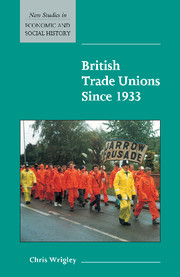Book contents
- Frontmatter
- Contents
- List of tables
- 1 Introduction
- 2 Economic recovery and war, 1933–1945
- 3 Trade union development, 1945–2000
- 4 Strikes, 1945–2000
- 5 Incomes policies, 1948–1979
- 6 Trade union legislation, 1945–2000
- 7 What have trade unions done?
- List of references
- Index
- Studies in Economic and Social History
- New Studies in Economic and Social History
4 - Strikes, 1945–2000
Published online by Cambridge University Press: 05 June 2012
- Frontmatter
- Contents
- List of tables
- 1 Introduction
- 2 Economic recovery and war, 1933–1945
- 3 Trade union development, 1945–2000
- 4 Strikes, 1945–2000
- 5 Incomes policies, 1948–1979
- 6 Trade union legislation, 1945–2000
- 7 What have trade unions done?
- List of references
- Index
- Studies in Economic and Social History
- New Studies in Economic and Social History
Summary
Strikes feature prominently in almost any list of what was wrong with British industrial relations or British trade unionism after 1945. Strikes, especially unofficial strikes, were deemed to be a feature of ‘the British disease’. The Royal Commission on Trade Unions and Employers' Associations 1965–1968, chaired by Lord Donovan, was much concerned about the increasing ‘resort to unofficial and unconstitutional strikes and other forms of workshop pressure’ (Royal Commission, 1968, 261).
Such concerns have led to a considerable literature discussing the nature of strikes in Britain. What were the main causes? Were some industries, some industrial plants, even some particular parts of plants more strike prone than others? Were strikes in some way uniquely a British problem? Was the pattern changed during the Thatcher years (1979–90) or Thatcher–Major years (1979–97)? These are some of the questions which have arisen on a topic which has been a major component of popular conceptions, or misconceptions, of ‘overmighty trade unions’.
The statistics on strikes after the Second World War are relatively good. As ever, there remain relatively minor problems of comprehensiveness. Apart from the matter of whether small, short strikes have been reported at all, even those which have been reported have not been included in the statistics if they have lasted less than a day and involved fewer than ten workers unless 100 or more working days have been lost.
- Type
- Chapter
- Information
- British Trade Unions since 1933 , pp. 40 - 54Publisher: Cambridge University PressPrint publication year: 2002

